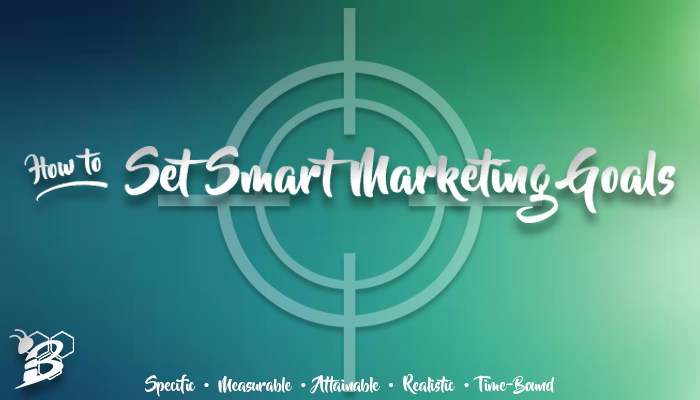In a previous blog post titled The Importance of Setting SMART Marketing Goals, I talked about what a SMART goal is and why you should be setting them for your business. Now that you understand why they are important, it's time to actually set your goals! This is a crucial step towards success but is something that is easier said than done in most cases. Chances are you have an idea of what you want your business to accomplish in, say, the next 12 months but actually solidifying that goal and taking steps towards reaching it can still be challenging.
This 6 step approach should help you set and structure SMART marketing goals for your business:
Step 1: Summarize
As business people, we all have a lot of goals for our businesses, big and small. The first step is to coherently summarize those goals in an easily digestible way. Ultimately you want to be able to explain your goal in a quick and simple manner.
When summarizing your goal, don't forget about your SMART (Specific, Measurable, Attainable, Realistic, Time-bound) framework. In this step, you want to pay particular attention to the Specific, Attainable and Realistic portions of that framework. I'll talk a little more about Measurable and Time-bound in a minute.
Step 2: Categorize
Categorizing your goal will ultimately help you measure your success. Having a specific thing you are working towards will allow you to evaluate the metrics periodically and determine how close you are to your goal and, ultimately, when you reach it.
We've found that most marketing goals fall in one of three categories:
- Get more visitors to your site
- Convert more visitors to leads
- Close more leads into customers
Step 3: Pick a Number
Much like in step 2, the measurable portion of the SMART framework comes into play here in a big way. Having a specific number to reference will help you easily measure your progress and know exactly how far you have left to go.
Step 4: Select a Completion Date
Here is where we focus on the T of SMART (time-bound). Simply developing a goal is great but if you don't have a day in which you're shooting to complete the goal, then you are less likely to put a ton of effort towards it. So choose a realistic date for when you're looking to accomplish this goal. As businesses, a lot of us set goals for our fiscal year. If you want to do that, GREAT! But you don't HAVE to stick with the fiscal year, set a goal whenever it makes sense for you, just make sure that you determine a timeline to have it completed.
Step 5: Write It Down
Not only does putting your goal in writing force you to be clear and concise, it also makes you more likely to be consistent in pursuing that goal and ultimately succeed. In fact, research indicates that people who write down their goals have over an 80% higher success rate of achieving them.
At this point, you might be asking "ok...you want me to write this goal down but what is it supposed to look like?!" Let's take a look at a sample goal! Let's pretend for a minute that you've decided you want to increase leads by 60% in 12 months. In the SMART framework, this is what that goal should look like the following:
Increase leads by 60% (starting at 1,500 and ending at 2,400) by June 2017.
Step 6: Review
Before you decide to go all in on this goal, take another look at it. Make 100% sure that it follows the SMART (Specific, Measurable, Attainable, Realistic and Time-bound) framework. During this step, you might want to refer back to my outline of the individual pieces of the framework here to make sure you've covered them all.
It's no secret that goal setting can be a difficult and time-consuming process but having SMART goals in place is a great way to both ensure your marketing is aligned across the board and to measure your success. And, once you've accomplished that goal, think about how great you'll feel!



.png?width=100&height=100&name=HubSpot%20for%20K%E2%80%9312%20Education%20How%20Schools%20Use%20HubSpot%20to%20Improve%20Enrollment%20(and%20How%20to%20Set%20It%20Up).png)
.png?width=100&height=100&name=The%20Complete%20Guide%20to%20HubSpots%20Prospecting%20Agent%20(2025%20Edition).png)
